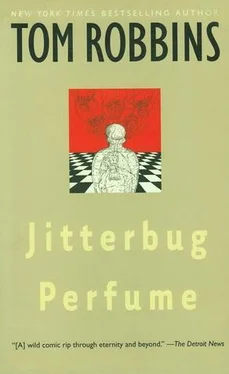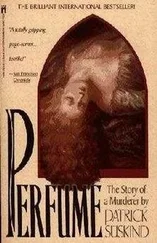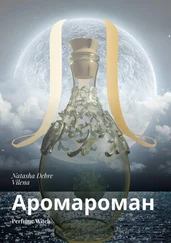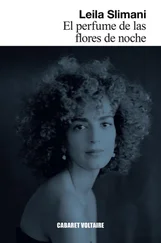(2) In the world of the nonliving, she had been reunited with her parents, with Navin the Ropemaker, and with her abandoned children, about whom she felt, Alobar knew, continued remorse. (Alobar secretly blamed himself — no seventeenth-century male would publicly admit to such a shortcoming — for Kudra's failure to conceive in their recent efforts, but, of course, the fault lay with the pennyroyal that she had ingested for over seven hundred years and which had left a contraceptive residue that would bash sperm in the head for a long time to come.) In that case, she would choose not to rematerialize for a while, if ever.
(3) She had landed safely on the Other Side and was searching there for him. Since she had no way of knowing that his dematerialization had been aborted, perhaps she feared that he was lost.
(4) She had landed on the Other Side and become lost there, herself. Maybe she longed to come back but couldn't find her way.
(5) Since their practical objective in learning to dematerialize was to transport themselves across the Atlantic, it could be that Kudra had crossed directly and was waiting for Pan and him to join her in the New World.
In the event that it was reason number one that detained her, there was nothing Alobar could do but grieve. If it was number two, he could only carry a torch, as they say, and hope that his love would eventually draw her back to him. To deal with possibility three or four might or might not require him to dematerialize, but, in either case, he instinctively felt that their long-sought perfume would be the key to their finding one another again. For that matter, if it was number five that was correct, if she had taken advantage of a free and easy passage to the New World and was counting on Pan and him following her, the perfume would also be necessary, both as a mask for goat gas and as a signal in case their seeing one another directly was prevented by natural or supernatural obstructions.
Well, at least he could provide the perfume now. Or could he? That question — and a sack of beakers, tubes, crucibles, industrial-strength candles, citron, jasmine oil, and a five-ounce bottle with Pan on its side — weighed him down on the long trek to Bohemia.
The beet harvest was right on schedule. Toward the tail of July, peasants were in the fields from morning until night, ripping whiskered fetuses from the planetary mud. A steady parade of oxcarts wound toward the villages, bearing baskets of smokeless coals and sacks of idol eyes. Concealed in a hillside thicket, Alobar kept one eye on the harvest, one on the road to the west, down which he expected at any moment to see an hashish-colored woman jiggling and swaying: jumping beans in aspic, a satin ship rolling in a tide of licorice sauce.
The harvest petered out, the woman never appeared, but the Bohemian farmers, as they had done since Alobar could remember, left a few acres of beets undug so that they might complete their cycle and provide the seed for next year's crop. There was a patch of seed-beets here, a patch there, often miles apart. Alobar mapped the countryside, X-ing the fields where the treasure lay. He needn't have bothered. By mid-August, his nose could have led him blindfolded to the places where the pollen was congregating.
In the dark of night, Alobar and Pan collected the viscous powder from the plant tops, filling beakers that they stashed in a particularly dense thicket. Twigs and branches jabbed at their eyes, briers tore Pan's flesh and Alobar's clothing, but each dawn they kicked and shoved their way into the coppice, where they added another couple of beakers to the stash and lay down to sleep in a chaos of sweating vines, mucous leaves, and maggoty logs. Mistletoe dripped an unsavory liquid on them, a living confetti of spiders and earwigs dotted them from head to heel, curds of mushrooms and scrumbles of lichen soiled them to the bone, but Pan slept as if he were to that foul manor born, and Alobar was too desperate to care. His fitful dreams were all of Kudra, and when he lay awake in the rot and tangle, he sniffed at the contrasting clouds of musk that billowed from the god and the beakers of beet pollen, noting with immense satisfaction that they nearly cancelled one another out.
After a dozen containers had been filled, they hiked into the high hills, where smoke would not be noticed, and, while Pan lay on the humus, noodling his pipes (Alobar had fetched them in his sack, and they put the local fauna into a tizzy), Alobar constructed a crude laboratory. He boiled down the beet pollen into an extract, gray, gooey, and possessed of a basso profondo that could have brought the rafters down in the grand opera of smell.
When all the extract had been made, Alobar shook the wood lice out of his britches, washed his face in a creek, and set out for a large town on the Russian border, where he knew a vodka master to reside. Pan was left behind to guard their equipment. Without the feeble god to slow him, Alobar reached the town in a week. There, he approached the vodka maker, who, in return for the last of Alobar's French gold pieces, agreed to distill the beet pollen extract, an operation that, to Alobar's displeasure, consumed the better part of a month.
The job at last complete, Alobar tied a gallon jug of distillate to each end of a stout pole, rested the pole across both shoulders, and left the town at a trot. Were it not for the preciousness and weight of his cargo, he might have left at a gallop. He was anxious about Kudra, who could have returned in his absence, anxious about Pan, who could have strayed. In as much as his health would permit, Pan had cooperated in the venture to disguise his malodor and transport him to the New World, but he hardly could be rated enthusiastic. He was, in fact, so nonverbal, so distant, distracted, solitary, and, even in his invisibility, especially in his invisibility, charged with psychic shock, that nothing he might have done would really have surprised Alobar, who had little choice but to withhold trust. Stopping neither to eat nor sleep, his brain hot with imagined disasters, the man who once was a king in this land flapped through the countryside in his filthy rags, his boots falling away from his feet, his latest beard flying in the wind like a nauseated Chinaman losing his bird's nest soup.
Their camp proved blessedly intact, Pan present and accounted for, molesting a confused doe that he had attracted by his piping. As the poor deer sprang into the bushes, Alobar lifted the pole from his raw shoulders. “'Tis done,” he said, and lay down in the lean-to, falling immediately into a wife-infested slumber.
Twelve hours later, he awoke and set at once to mixing the beet pollen distillate with jasmine oil and citron essence, in varying proportions. After five days of experimenting, he hit upon what seemed the ideal mixture: one part beet to twenty parts jasmine to two parts citron, a ratio that inspired him to name the scent K23 . The K was for Kudra.
Like a lobster with a pearl in its claw, the beet held the jasmine firmly without crushing or obscuring it. Beet lifted jasmine, the way a bullnecked partner lifts a ballerina, and the pair came on stage on citron's fluty cue. As if jasmine were a collection of beautiful paintings, beet hung it in the galleries of the nose, insured it against fire or theft, threw a party to celebrate it. Citron mailed the invitations.
If Alobar could trust his nose, K23 stopped Pan in his tracks. It seemed to throw a mantle — gossamer in places, heavily embroidered in others — over his funk, and however long and hard the goat musk might squirm beneath that cloak, it could not wriggle free. “I wonder if I am only imagining that it is so effective?” worried Alobar. “Perhaps it is wishful smelling.” There was nothing to do but submit it to objective testing.
Читать дальше












